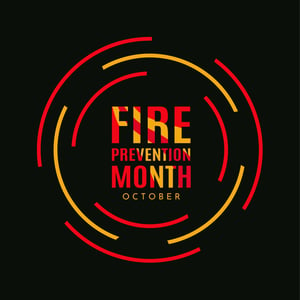 October is Fire Prevention Month. Every year in the United States, about 2,600 people die in residential fires. One of the leading causes of death is from inhaling smoke and toxic gases, not from burns. Smoke travels farther and faster than flames.
October is Fire Prevention Month. Every year in the United States, about 2,600 people die in residential fires. One of the leading causes of death is from inhaling smoke and toxic gases, not from burns. Smoke travels farther and faster than flames.
In this week’s blog, I had the privilege of interviewing a local firefighter and asking him some questions.
Q: What's the number-one fire prevention tip you'd give families?
A: The number-one fire prevention tip I give families is to have working smoke detectors. A working smoke detector is critical for the early detection of a fire in your home. It could mean the difference between life and death. A smoke detector is the first crucial step in keeping your family safe.
Most fires occur when families are asleep. They’re unaware of the danger until there’s insufficient time to escape. A smoke detector acts like a sentinel around the clock, and when it first senses smoke, it sounds a high-pitched alarm. This often allows precious but limited time to escape.
About two-thirds of fatalities occur in homes that don’t have working smoke detectors. Properly installed and maintained smoke detectors are considered one of the best and least expensive ways to provide early warning of a potentially deadly fire. The early warning could reduce the risk of dying from a fire in your home by almost half.
Smoke detectors should be installed on every level of your home, outside sleeping areas, and inside bedrooms. They should be installed and maintained according to the manufacturer’s instructions. When installing them, many factors determine where and how many you need to install. Consider placing alarms along your escape path to help you escape the house if it’s hard to see. In general, you should set alarms in the center of a ceiling, or if you place them on a wall, they should be 6 to 12 inches below the ceiling.
To learn about the different types of smoke detectors, click here.
Q: What are some fire prevention tips parents can give their children?
A: Parents should talk to their kids about how smoke detectors work and try testing them when the child/children are sleeping. Some smoke detectors will not awaken a child or alert them during heavy sleep. Test them so they know what the detector sounds like.
Another tip I give is to ask if your child knows their address and phone number. If they don’t, do your best to make sure they memorize them. We find that 50% of third and fourth grade children don’t know their address or phone number. If your child has difficulty remembering numbers, write the number in an area where the child spends a lot of time. Let’s face it; most of us don’t look at the address numbers on our house or apartment that often.
I also tell people to remember senior citizens and their neighbors. Ask them if they replace batteries or test their smoke detectors. When people think about fire safety, many assume it’s just for children. It should be for everyone.
Q: What resources are available for kids/families if they want to learn more?
A: A great resource is your local fire department. Take the time to stop in and ask questions. In addition, information is just a click away. The National Fire Protection Agency (NFPA) has excellent information, as does the Wisconsin State Fire Inspectors Association (WSFIA).
Q: What are some of the big lessons you've learned as a firefighter?
A: One lesson I learned is that good fire prevention can lead to everyone’s safety. If we can educate the public about fire safety, it will not only ensure your safety; it will make our jobs safer.
Another lesson I learned is the importance of changing batteries twice a year. It’s incredible how many smoke detectors I see that don’t work simply because the batteries are dead.
Q: What, if any, myths exist about fire prevention that you'd like to address?
A: One myth is that fire sprinkler systems cost too much. Another is that if one head in a sprinkler system activates, all the heads will activate. This isn’t true in a residential sprinkler system. Hollywood movies show all the heads going off after one head is activated. I encourage people to research fire sprinkler systems to discover the benefit of these systems.
Here are other fire safety articles posted on West Bend Cares.
House Fire Prevention: How To Store And Dispose Of Oily Rags
Five common appliances that cause house fires
Tips for selecting a home fire extinguisher
A clean chimney can save your home and your family!
10 tips to help prevent candle fires in your home
Preventing heating fires in your home
Source:





